- Home
- Eoin Colfer
The Fowl Twins Deny All Charges Page 2
The Fowl Twins Deny All Charges Read online
Page 2
Beckett plucked another question from his seemingly endless supply. “And nobody we actually care about will be angry with us because we’re not where we’re supposed to be?”
Myles rolled his eyes. “Beck, everybody would be angry with us if they knew of our whereabouts. Positively furious, in fact. Lazuli would revoke our parole. Mother and Father would ground us, at the very least. Even Artemis would probably have the gall to lecture us from space.”
“So why aren’t we where we’re supposed to be?” wondered Beckett.
Myles defied the rules of air-travel safety to unclip his belt and stand.
“Because we are Fowls,” he declared, pointing a stiff finger skyward, melodrama being his weakness. “And Fowls always do the unexpected.”
Beckett thought about this and then deflated Myles’s moment with one of his trademark truisms. “Which is only to be expected.”
“That is not accurate,” Myles argued. “There are a finite number of expected actions in any situation, whereas there are an infinite number of actions that would be unexpected.”
“But you know, in general,” Beckett persisted, which was not like him unless he felt Myles would be irritated. “If you do loads of unexpected things, then unexpected loses its un. Which just leaves expected.”
Myles was perfectly aware that winning this debate would be more difficult than convincing a flat-Earther that the globe was in fact a globe, so he was actually quite relieved when NANNI posted an alert on the lenses of his smart glasses, giving him a genuine reason to change the subject.
Myles transferred the alert to the jet’s front windshield and magnified it with an expanding pinch gesture.
“Look, brother mine,” he said, pointing to a streamlined cylinder streaking toward the plane. “There is a missile headed our way, and it has locked on to us.”
“A missile!” said Beckett gleefully. “Wonderful. We’ll get back to the argument you’re losing later.”
And, with the flick of a switch, he launched the Tachyon’s regular countermeasures without waiting for the order, as switch-flicking was one of his favorite pastimes. Beckett even had a plank fixed to the wall in the twins’ shared bedroom to which he had screwed various switches, and he would spend hours flicking them on and off, which sent Myles’s misophonia into overdrive.
But back to the countermeasures. Missile countermeasures are very popular, especially among pilots who are eager to remain alive, and those of the Tachyon took three forms:
Form the first was a burst of infrared flares that presented a heat-seeking missile with multiple targets, to trick it into blowing up something else superhot besides the jet engine it was aimed at, because, despite the Tachyon’s impressive thermal shielding and bypass engines, it was inevitable that enough heat bloom would leak out for a sophisticated missile to lock on to.
The second countermeasure was a confetti of shredded aluminum, plastic, and paper that, when released, could possibly bamboozle the radar lock of a missile.
And the third effort to confuse rockets was an electronic countermeasure pod in the jet’s nose cone that would jam the radar of the incoming seeker if the confetti failed.
These measures were nowhere near trustworthy enough for Myles, however, relying as they did on proximity, the missile’s own particular guidance system, and fuel reserves. So Myles had, with NANNI’s considerable input, augmented the Tachyon’s countermeasure systems with two more of his own design.
The first of these was a half dozen high-speed drones with holographic capabilities, which would project six alternate Fowl Tachyons into the sky for any remotely piloted missile to target, and the second was a pair of rail guns that were capable of firing projectiles at speeds in excess of Mach 5. Myles’s rail guns were concealed behind retractable panels on both wings. The starboard gun was a plasma model and fired hot ionized particles that would punch a hole through almost anything they encountered, and the port gun fired cyber weapons in the form of limpet pods that would clamp on to their target’s hull and assume control if possible and shut down all systems if not. Some months ago, Myles had presented Beckett with the acronym BCRYPTs for these ingenuous pods. He’d informed his twin that BCRYPT stood for Ballistic Cyber Recon pods with Yottabyte Potential Transfer capabilities. Myles had also rather smugly explained that the acronym was something of an Easter egg for tech enthusiasts, as Bcrypt was the name of the robust algorithm employed after the infamous 2016 Yahoo hack. If Myles had been expecting a pat on the back for his clever wordplay, he was sorely disappointed, as Beckett declared the acronym to be both stupid and ridiculous. Beckett had just learned about scarab beetles in Egyptian history and decided the pods looked like big beetles and therefore should be called SCARABs. Thus Myles was forced to come up with a justification for this new name and eventually settled on Systems for Cyber Attack Re-task And Breach, which he had to admit was both more to the point and catchier.
So, even though there was a missile streaking toward the Fowl Tachyon at six miles per second, neither Fowl twin was particularly anxious, as they had a few tricks up their sleeves, or in this case, wings.
Myles very sensibly sat down and fastened his seat belt, as he was aware that Beckett might launch into evasive maneuvers whether or not they were needed. His twin had once pushed the Tachyon through a barrel roll simply because he’d had a cold and thought the flying pattern might unblock his sinuses.
NANNI’s avatar appeared on the windshield and confirmed what the twins could already see.
“The missile has cleared the first countermeasures,” announced the superintelligent AI. “It is not interested in our flares, jammers, or confetti, apparently.”
“Unbelievable,” said Beckett. “Everyone loves confetti. It’s like a party in the sky.”
Indeed it did seem that the missile had no interest in sky parties and refused to be distracted from its target. It was still streaking toward the Tachyon, an unusual purple afterburn trailing it.
“Twenty seconds to impact,” said NANNI. “Maybe we should do something?”
Do something? thought Myles. That’s not very helpful. But what he said was “Launch the holograms, brother.”
“Really, brother?” said Beckett, seeming uncharacteristically reluctant to flip a switch. “Maybe we should—”
Myles reckoned there was no time for maybe we shoulds at this juncture and flipped the switch himself, ejecting six tiny drones from the fuselage.
These drones had been programmed to project high-res images of the Tachyon that would be opaque even in full sunlight and might confuse a remote pilot. And perhaps this ploy might even have worked had the drones projected what Myles had originally scanned into their drives. But instead of holographic jets, there appeared in the troposphere six free-floating versions of one crudely animated humanoid figure who appeared to be pooping through his index finger.
Myles was close to dumbfounded, but only close. “Beck, is that Alien Pooping Boy?”
Beckett nodded. “I was bored, so I put him in the computer. I thought he would be more distracting than jets.”
Myles glared at his brother. “Tell me the truth now, brother. Did you animate this yourself?”
“I did,” said Beckett. “It was easy. I used the code you taught me.”
Myles was tutoring Beckett in several areas, including algebra, the notion that actions have consequences, and coding.
Myles felt his eyes tear up a little, not because they were seconds from death, but because his twin had actually applied learned knowledge.
“Well done, brother mine,” he murmured softly. “Kudos to you.” And then to NANNI Myles said almost casually, “Deploy the rail gun, then, I suppose, but SCARABs, if you please, NANNI. No need to announce our arrival to the world with an explosion. Also, I would like to get a look at the mechanics of that rocket. The afterburn has an unusual hue.”
“Agreed,” said NANNI. “And I would like to get a look at that thing clamped to the fuselage. Just out of curiosity.
”
“Oh yes,” said Beckett. “Let’s take a look at the thing. I love things. And it’s alive, I think. I saw a wiggle.”
“That thing?” said Myles. “What thing?”
NANNI enlarged the image on the smart screen—not that there was much enlargement required, as the missile was getting dangerously close to its target. There was very clearly something attached to the rocket’s fuselage just forward of the tailfins and, if that thing were alive, as Beckett suggested, then there was no question of strafing the missile with ionized particles.
Myles used his own smart lenses to take a closer look and saw that the thing was a glittering translucent blob of sorts and had the approximate dimensions of a laundry bag, and indeed there seemed to be a hairy foot wiggling within it.
“I think we have a hobbit,” said NANNI.
This was a patently outrageous statement that Myles fully intended to debunk at a time when the Tachyon was not being chased down by a missile, right after he explained to Beckett why continuously acting in an unexpected fashion did not make a person predictable. But for the time being, even the perennially long-winded Myles was content to focus on what could now be accurately called the Cuban missile crisis.
“SCARABs, NANNI,” he said tersely. “Now.”
There was no need for him to issue the order, as it was already done. The SCARABs moved too fast for the human eye to follow, so NANNI helpfully charted their course on the smart windshield with a set of animated red arrows.
Myles leaned forward instinctively. This was the first time they had deployed the SCARABs in the field, and he was eager to see how effective they were, as he had spent quite some time boasting about them in a video package sent to Artemis. It would be mortifying if they failed now, not that anyone would be alive to be embarrassed.
He needn’t have wasted a nanosecond worrying. The SCARABs deployed perfectly and embedded themselves in the strange missile’s fuselage, sinking their electronic teeth into its workings.
“Yeah, baby!” exulted NANNI, whose personality was ever evolving. “You are toast.”
“Report,” said Myles through teeth that were most definitely gritted.
“Just a sec,” said NANNI. “Let me wrangle this ole steer.”
Myles groaned. The AI’s superintelligence did not appear to be presenting superintelligently, but the imagery appealed to Beckett, who let out what could only be described as a cowboy holler.
On-screen, the missile turned into a schematic of itself and electronic feelers reached out from the SCARABs’ sensors deep into its workings.
“Okay,” said NANNI. “We’re in. I’ve slowed this sucker down considerably. She’ll fly, but only just. The hobbit is within a bubble that is secured to the missile by some form of adhesive. A magnetic pulse should loosen it up and wind shear will do the rest.”
“Missile design?” asked Myles.
“Unfamiliar,” replied the AI. “Could be fairy, but not like anything we’ve seen. It’s pretty basic by LEP standards.”
“What’s the payload?” Myles wondered.
“Nothing nuclear, which is good. Just some kind of concussive device, barely enough to blow itself up. I can take a closer look at that later—right now we have a slight problem.”
“NANNI,” said Myles through still-gritted teeth, “please relate all pertinent information in a single statement. This piecemeal delivery is quite frustrating.”
“Okay, grumpy,” said NANNI.
“Myles is overtired,” said Beckett. “He needs a gummy.”
“I do not need a gummy,” said Myles emphatically, while also inching his hand toward the supply of candy in his bag. “Just tell me what this ‘slight problem’ is.”
NANNI did so without further ado. “The missile detonates on impact, but it also has a timer, which I can’t seem to access.”
“Simply point the thing into space and let it explode,” said Myles. “How long do we have?”
“Three minutes,” said NANNI.
“Plenty of time,” said Myles. “Not a problem, surely.”
“Unless you’re a hobbit,” said Beckett.
Which was a fair point.
“Hmm,” said Myles. “I—”
Beckett cut him off, giddy with excitement. “Myles said ‘hmm.’ That means he doesn’t know, and that means I’m the boss. And I say: midair transfer.”
NANNI extended a holographic hand from the screen and fist-bumped Beckett. “I agree, partner. Just like we practiced.”
“Wait…” said Myles. “What? Practiced?”
Beckett shook his head sadly. “Those are bad sentences, brother. Use your words.”
But Myles was at a loss for words, or, for that matter, a better idea. And Beckett took his brother’s silence to mean that he was clear to assume control.
Heaven help them both.
And the hobbit.
Haven City
Twelve Hours Earlier
Specialist Lazuli Heitz of the LEPrecon division was in the throes of an exceedingly bad day. It was the caliber of day most people experience only once in their lives—and when they do, they are usually quite dead by suppertime. And though this day would in all probability conclude with a fatality or two, it is accurate to say that Specialist Heitz had already survived a number of such calamitous days, mainly due to the Fowl Twins, who had, in all fairness, usually caused the life-threatening events in the first place.
This day, however, would outshine all others in terms of sheer variety, because it began with a visit to the hospital and ended with an unexpected supersonic trip that we shall presently attempt to keep pace with narrative-wise.
Lazuli had not volunteered for the hospital appointment, nor did she feel especially ill, except for an enduring tickle in her throat that had persisted ever since she spontaneously shot flame out of her mouth during a recent Fowl-related incident on the Island of St. George off the coast of Cornwall (see LEP file: The Fowl Twins). It was this firepower that prompted her elf superior and mentor, Commodore Holly Short, to book her a slot in the recently opened Magitek wing of the J. Argon Clinic in Haven City. Dr. Jerbal Argon had managed to tempt the centaur genius Foaly away from the LEP to run the facility by offering him a huge salary and also a corner office that overlooked both Police Plaza and downtown Haven.
Specialist Heitz sat in this office now, rubbing the spot on her upper arm where she had just been injected. The shot had stung a little, but not as much as the inoculations that all LEP officers had to obtain to be granted above-ground visas. In addition to the pain, Lazuli was feeling a little exposed in one of those paper-thin hospital gowns that somehow contrive to be both oversized in the front and summer-breezy in the rear. She might have objected had Foaly not jammed a tongue depressor down her throat while he took a look at her workings. Just when Lazuli believed she would surely gag, Foaly withdrew the instrument and clopped around to his side of the desk.
“Fascinating,” said the centaur, tossing the depressor into the whirring maw of a recycling chute. “You don’t have any of the goblin mechanisms: oil glands, spark teeth, and so on….”
Lazuli waited politely for a conclusion to this line of thought, but apparently this was not forthcoming, as the centaur began drawing a complicated 3-D model of Lazuli’s throat in the smart space over his desk.
“And so on…?” she prompted eventually.
Foaly jerked as though he’d forgotten she was there. It was classic absentminded-genius behavior.
“Oh yes. And so on. Where was I? You don’t have the mechanisms, you see, to…” The centaur wiggled his fingers furiously in front of his mouth, which Lazuli assumed was supposed to represent whooshing flames. “So it was magical. The entire episode. I have never seen anything like it—though I suppose I didn’t see it this time, either, but Holly assures me it did in fact take place, which is why I injected you with the magic-suppressor. That tiny chip will prevent you from accidentally vaporizing your squadron during a briefing, which I think
would be bad.”
“Yes,” agreed Lazuli. “Very bad.”
Foaly nodded. “Indeed. So, the chip keeps everyone safe. Try not to get electrocuted and short it out.”
“I’ll try,” said Lazuli.
Foaly paused and fixed Lazuli with a curious stare. “I do apologize for staring, but you are a hybrid, and a pixel at that. Doubly blessed, I would say. You are, in my opinion, the next step in fairy evolution. Absolutely fascinating from a scientific point of view, though not everyone shares my perspective. Hybrids are not even considered one of the official fairy families.” He winked at her. “Neither are centaurs, but who wants to be official, eh? Or even normal? Whatever that is.”
Lazuli was amazed.
For as long as she could remember, there had been supposedly enlightened fairies who looked down on her because she was half pixie and half elf. She had not been expecting prejudice in this office, considering the esteem in which Commodore Short held the Magitek director, but she had not been expecting such kind words, either.
Lazuli shook her head. “No,” she said. “Who wants to be normal?”
But the truth was, she had ached to be normal for the longest time.
“So, Specialist Heitz,” said Foaly, “the next step is an MRI, if you’re up for it?”
MRI, thought Holly. Magical Resonance Imaging. The next step in turning magic into a science. What this building is all about. Am I to be their latest subject? Jammed full of needles and radioactive fluids?
When Foaly wasn’t self-obsessing, he could at times be quite perceptive, and this proved to be one of those occasions.
“Don’t fret, Specialist. We’re not going to turn you into some kind of laboratory experiment, if that’s what you’re worried about. We are not human, after all. We need to find out what you are capable of and what damage you might have done to yourself internally. Shooting flames from your mouth can’t be good for one’s tooth enamel.”
The centaur laughed, and his warbling titters were contagious enough to make Lazuli smile at least.

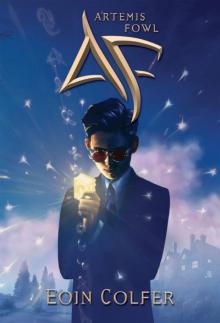 Artemis Fowl
Artemis Fowl Plugged
Plugged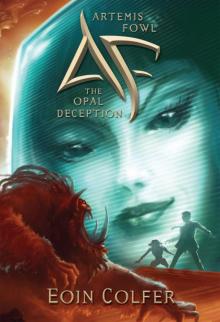 The Opal Deception
The Opal Deception The Arctic Incident
The Arctic Incident The Wish List
The Wish List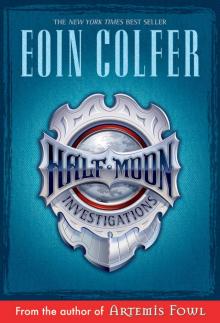 Novel - Half Moon Investigations
Novel - Half Moon Investigations The Supernaturalist
The Supernaturalist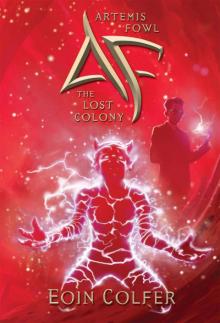 The Lost Colony
The Lost Colony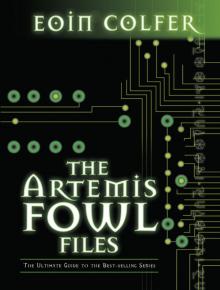 The Artemis Fowl Files
The Artemis Fowl Files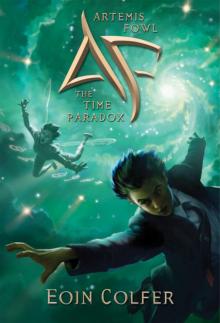 The Time Paradox
The Time Paradox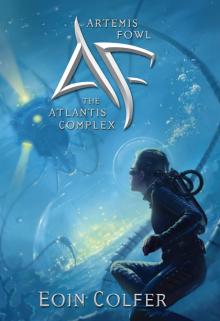 The Atlantis Complex
The Atlantis Complex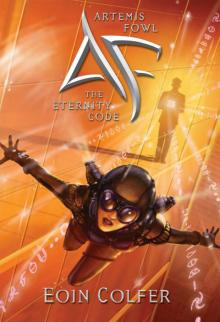 The Eternity Code
The Eternity Code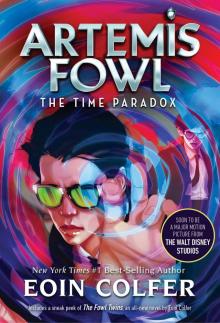 The Time Paradox (Disney)
The Time Paradox (Disney)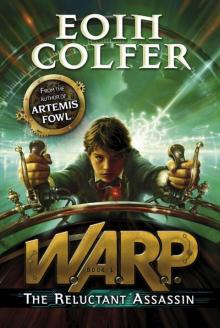 The Reluctant Assassin
The Reluctant Assassin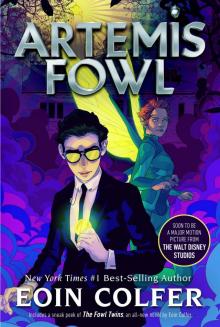 Artemis Fowl (Disney)
Artemis Fowl (Disney) Highfire
Highfire The Last Guardian
The Last Guardian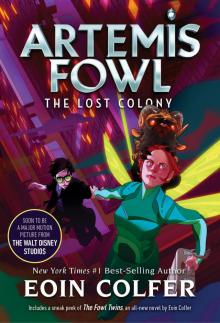 The Lost Colony (Disney)
The Lost Colony (Disney) Screwed: A Novel
Screwed: A Novel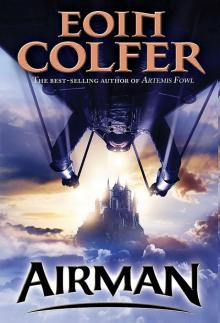 Novel - Airman
Novel - Airman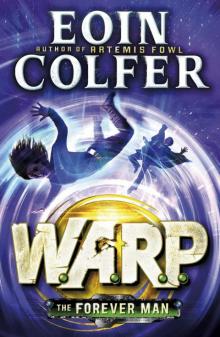 The Forever Man
The Forever Man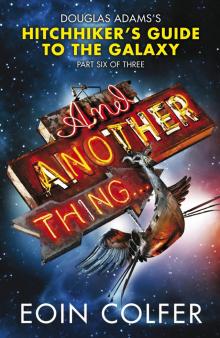 And Another Thing...
And Another Thing...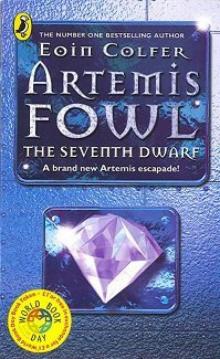 The Seventh Dwarf
The Seventh Dwarf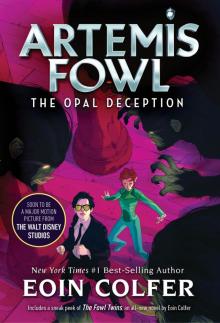 The Opal Deception (Disney)
The Opal Deception (Disney)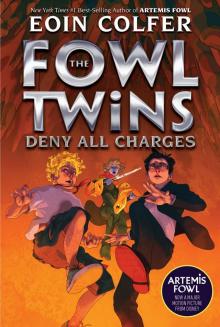 The Fowl Twins Deny All Charges
The Fowl Twins Deny All Charges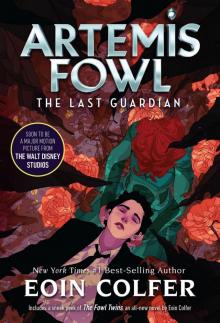 The Last Guardian (Disney)
The Last Guardian (Disney)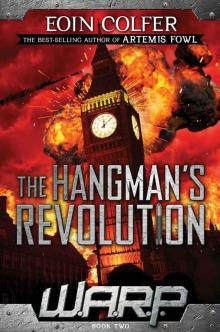 The Hangman's Revolution
The Hangman's Revolution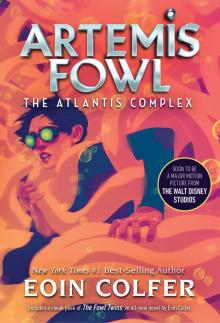 The Atlantis Complex (Disney)
The Atlantis Complex (Disney)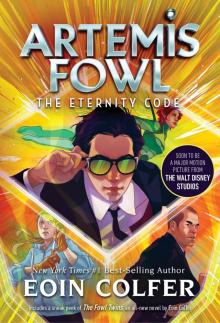 The Eternity Code (Disney)
The Eternity Code (Disney)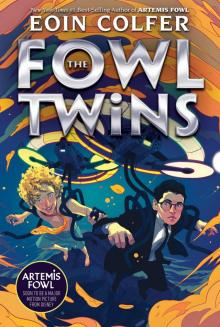 The Fowl Twins
The Fowl Twins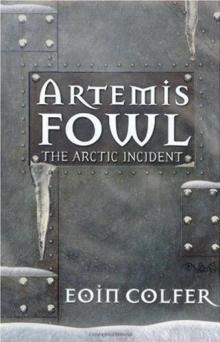 Artemis Fowl. The Arctic Incident af-2
Artemis Fowl. The Arctic Incident af-2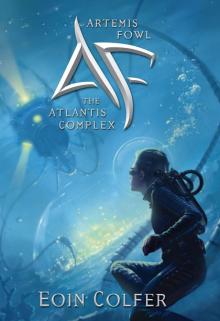 Artemis Fowl and the Atlantis Complex af-7
Artemis Fowl and the Atlantis Complex af-7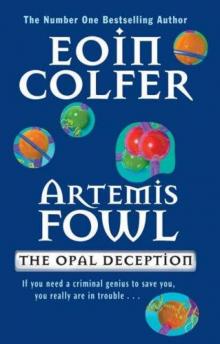 Artemis Fowl. The Opal Deception af-4
Artemis Fowl. The Opal Deception af-4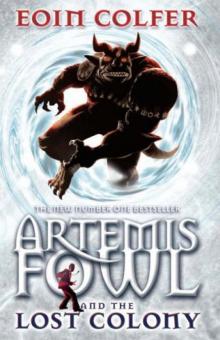 Artemis Fowl. The Lost Colony af-5
Artemis Fowl. The Lost Colony af-5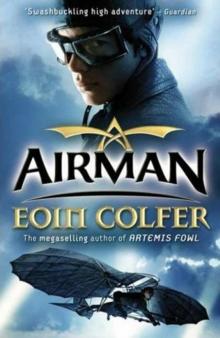 Airman
Airman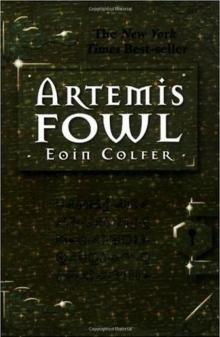 Artemis Fowl af-1
Artemis Fowl af-1 Artemis Fowl: The Eternity Code af-3
Artemis Fowl: The Eternity Code af-3 Screwed dm-2
Screwed dm-2